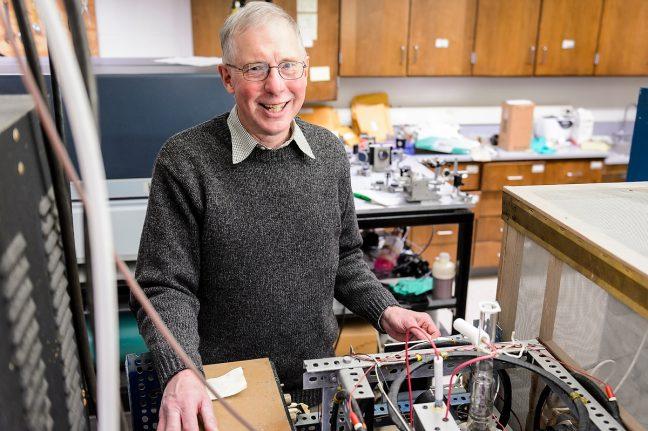Some reach for the stars. Others, like University of Wisconsin professor James Lawler, devise ways to measure their chemical elements.
For his longstanding and ongoing contributions to the field of astrophysics, the American Astronomical Society awarded Lawler the 2017 Laboratory Astrophysics Prize.
Over the past four decades, Lawler helped develop various methods and technologies that further the scientific understanding of galactic nucleosynthesis and chemical evolution.
The UW Arthur and Aurelia Schawlow professor of physics began his career as an undergraduate at the University of Missouri–Rolla in 1973. After graduating with a Bachelor of Science in physics, he continued his studies at UW, finishing with a master’s in 1974 and a Ph.D. in 1978.
His interest in the field began as more spectroscopy — the study of how light interacts with matter — technology became available in the ’70s and ’80s. The basic business of atomic spectroscopy, he said, played a central role in the development of quantum mechanics and modern physics.
“What pushed me in this field was the lasting significance [of it],” Lawler said. “It’s the way we learn about the remote universe; it gives us the details of chemistry.”
During his tenure at UW, Lawler has overseen more than 30 graduate students, published more than 250 peer-reviewed articles and secured two patents.
Currently, Lawler said his two main research interests involve gas discharge plasmas and laser spectroscopy. At the moment, he and his research group are looking at ways to study discharge plasmas for applications including electric power switches.
“We do applied science and try to figure out what turns out to be more efficient and what can result in better and cheaper switches,” he said.
He and his research group work closely with major lighting companies, such as General Motors and Philips Lighting.
While astrophysicist is a title well-earned, Lawler also has a lesser-known identity: long-distance bicyclist.
Describing himself as a “very avid” long-distance bicyclist, Lawler has enjoyed Wisconsin’s latest push for converting old railroad tracks into bike paths.
“The trails are easy and the countryside is magnificent,” Lawler said.


